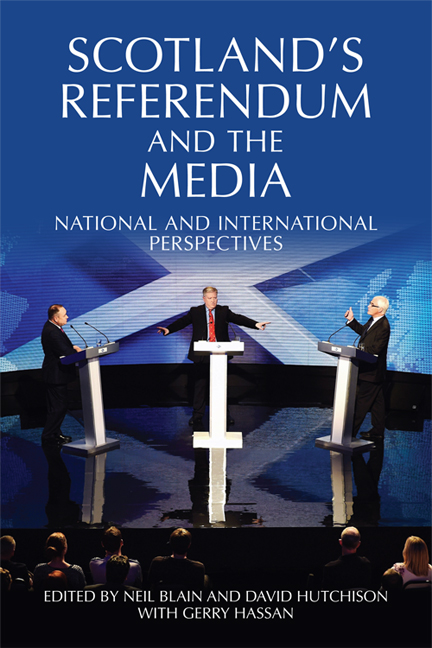Book contents
- Frontmatter
- Contents
- Preface
- Part One The Referendum in Scotland
- 1 The Unexpected Campaign
- 2 The Media Landscape in Scotland
- 3 Broadcasting and the Press: Some Key Moments
- 4 Scotland's Changing ‘Community of the Communicators’: The Political Commentariat and the Independence Referendum
- 5 The Scottish Press Account: Narratives of the Independence Referendum and its Aftermath
- 6 Scottish TV Coverage of the Referendum Campaign from September 2012 to September 2014
- 7 ‘Liked’, ‘Shared’, Re-tweeted: The Referendum Campaign on Social Media
- 8 Sport, Gender and National Identities
- Part Two Views from the UK
- Part Three International Perspectives
- Notes on the Contributors
- Index
3 - Broadcasting and the Press: Some Key Moments
from Part One - The Referendum in Scotland
Published online by Cambridge University Press: 05 August 2016
- Frontmatter
- Contents
- Preface
- Part One The Referendum in Scotland
- 1 The Unexpected Campaign
- 2 The Media Landscape in Scotland
- 3 Broadcasting and the Press: Some Key Moments
- 4 Scotland's Changing ‘Community of the Communicators’: The Political Commentariat and the Independence Referendum
- 5 The Scottish Press Account: Narratives of the Independence Referendum and its Aftermath
- 6 Scottish TV Coverage of the Referendum Campaign from September 2012 to September 2014
- 7 ‘Liked’, ‘Shared’, Re-tweeted: The Referendum Campaign on Social Media
- 8 Sport, Gender and National Identities
- Part Two Views from the UK
- Part Three International Perspectives
- Notes on the Contributors
- Index
Summary
Elsewhere in this section of the book are a chapter on the editorial stances adopted by the various newspapers, an analysis of the broadcasting output and a discussion of the performance of the Scottish commentariat. This chapter focuses on key moments in the run-up to the vote, specifically the publication of the White Paper on 26 November 2013 and the two television debates in August 2014, and considers how the mainstream press and broadcasting responded. As far as the White Paper is concerned, I draw on material published at greater length elsewhere.
For the analysis of the White Paper coverage, the early evening and late evening news and current affairs programmes of the BBC, ITV and Channel 4 at UK level and the output of BBC Scotland and STV transmitted to the domestic audience were examined, a total of ten programmes.
The first observation to be made is that the output reflected in almost textbook form the general approach of public service broadcasting in the UK, whether financed by licence fee or advertising, that is to say it has an obligation to seek to report events factually and to treat matters of current controversy in an even-handed way. Partisanship of the kind found in the press is unacceptable; judgements may be offered by journalists but committed commentary can only come from protagonists and, to an extent, from ‘experts’. And in a matter of controversy these ‘experts’ should cast light on the subject matter, not intensify partisanship.
All of the programmes led with the White Paper and gave it substantial coverage. Channel 4 News (also provided by ITN, the news service of ITV) was the only one not to do so; instead it led with a thirteen-minute item on a different UK political story before turning to the White Paper.
In the presentation of the contents of the document there was again a similarity. A correspondent, and not the programme anchor him/herself, outlined what it contained, while clips from the launch event were used as illustration. By way of balance, there was brief comment from the leader of the Better Together campaign, Alistair Darling.
- Type
- Chapter
- Information
- Scotland's Referendum and the MediaNational and International Perspectives, pp. 26 - 32Publisher: Edinburgh University PressPrint publication year: 2016



